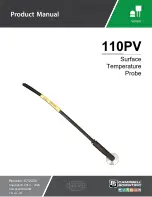
1.2 Introduction to the Instrument
1 – 5
allows the user to set the TEC current at a constant value. Four wire
connections to the TEC module allow accurate voltage sensing in-
dependent of resistive losses in the current leads, allowing for more
accurate device characterization.
For best temperature control, the autotuning feature of the LDC500
should be used. This will optimize the
P
,
I
, and
D
feedback param-
eters for the temperature control loop; the user can then inspect and
modify the loop parameters for best operation if necessary.
1.2.2
Grounding
For maximum user flexibility, many sections of the LDC500 are elec-
trically isolated from chassis ground, and from each other. In par-
ticular, the LD current source and the TEC controller are separately
floated. SRS recommends operating the laser diode, and the TEC
module, floating without connection to ground. Note that many laser
packages ground one terminal of the laser (either anode or cathode)
to the package case. We still recommend configurations where the
package case does not connect to ground. In situations where the
laser case must be connected to ground, be careful to understand
all
potential ground paths in your system to avoid inadvertant ground
loops or short circuits.
The monitor photodiode, if any, will perform best if also left floating,
or one terminal can be tied to one of the laser diode terminals. How-
ever, do
not
separately ground one of the photodiode terminals, as
this will interfere with the proper function of the laser diode driving
circuitry.
1.2.2.1 Grounding and modulation
It is important that the user understand the internal grounding ar-
rangement of the LDC500 when using analog modulation with a
ground-referenced laser diode. As can be seen in Figure 1.2, the cen-
ter and outer conductors of the Modulate BNC input are received
di
ff
erentially by an input amplifier which then modulates the LD
current source. The “ground” symbol in the figure, labeled “LD”,
is
not
chassis ground or any other externally-referenced potential; it
is simply an
internal
reference potential for the LD current source.
If the user’s laser is isolated from ground, then an earth-referenced
signal connected to the Modulate BNC will cause the “LD ground”
to come to earth.
If either the LD cathode, or the LD anode, is tied to earth, however,
then the internal node “LD ground” will be biased at a definite, neg-
ative potential relative to earth. The di
ff
erential input circuit (formed
LDC500 Series Laser Diode Controllers
















































